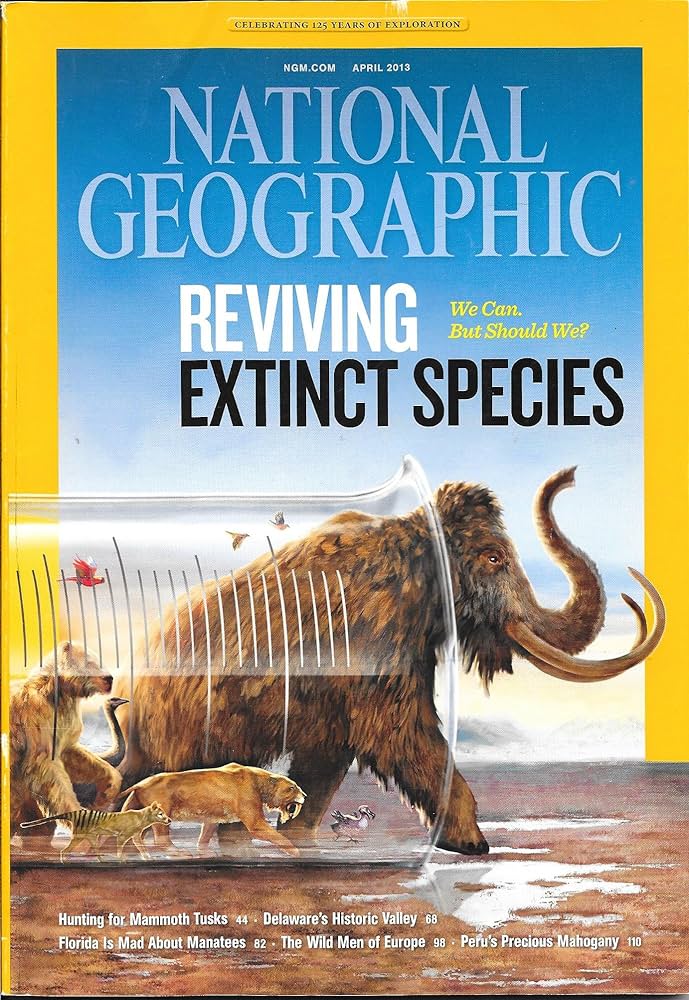Back in 2013, I was thumbing through the most recent issue of National Geographic at a friend’s house when two back-to-back stories caught my eye. The first was about the potential resurrection of woolly mammoths and other extinct species—a project being spearheaded by famed geneticist George Church. The second was about a group of “tusk hunters” in the remote New Siberian Islands, who set out every summer in search of mammoth tusks, then sell them on the Chinese black market as a (debatably) more eco-friendly alternative to elephant ivory.
What would it look like if these two stories converged? What if the hunters’ employers were only interested in the ivory as a means of discovering a full woolly mammoth carcass that could then be used for de-extinction? Thus, my play The Tusk Hunters was born.
And “born” rather than “eventually finished” really is the key phrase here, because after more than a decade of writing, revising, scrapping, and restarting through grad school and several development programs (a big elephantine thanks to Endstation Theatre, UT Austin and The Workshop Theater, in particular), the script still isn’t done. No other play has taken me this long to complete, and I’ve come to realize that it’s because of the story’s real-life inspirations. Today, in 2024, Church and his team haven’t brought back the woolly mammoth, but they’re a lot closer than they were a decade ago in terms of technology and funding, having founded a company called Colossal Biosciences with entrepreneur Ben Lamm to carry out their work. There’s also now the added wrinkle of using woolly mammoth de-extinction as a means of combating climate change (a process you can read more about here), the efficacy of which is hotly debated in the scientific community.
A Question of Ethics
So throughout the years, The Tusk Hunters has started feeling a lot more complicated—and intimidating—to finish. While I never set out to tell the true story of Church or Colossal, did I have a responsibility to weigh in on the ethics and effectiveness of de-extinction? Did I have to take a firm stance on whether or not their plan for mammoth-elephant hybrids to compact the spoil and help keep carbon in the ground would actually work? Did I even have a stance? Was there a part of me that was attracted to this story because I just really wanted to see a woolly mammoth both onstage and in real life? Because the true-life story of mammoth de-extinction doesn’t yet have an ending, it often felt like I was trying to predict the future.
Conducting more research didn’t always help, either. It reminded me of the complexity of de-extinction and made me feel more overwhelmed. Several academics and fellow writers I talked to don’t agree with Church, but after interviewing him several times myself, I had to respect his approachability, generosity with information, and openness to other ways of thinking. I also spoke to several zoologists and animal trainers who weren’t sure yet how they felt about Colossal’s endeavors. So, while interviews were always helpful in determining how I should write about unfamiliar topics such as permafrost, elephant-training, and genome sequencing, they only complicated The Tusk Hunters’ moral landscape. At one point, my draft took on an unnecessary scope, traversing time and space and featuring several Neanderthals as characters. Looking back, I think I knew in my heart that that wasn’t the right move, but I felt like my play couldn’t just be about two guys hanging out in a remote shack in the Arctic.
Or could it?
An R&D Epiphany
When I started bringing my pages—as well as my assorted woes about the script—to The Civilians’ R&D Group last fall, I assumed there would be encouragement to lean more into reality; to honor the real-life details of tusk-hunting and mammoth de-extinction in regards to timeline, geography, and some sort of political opinion. After all, this was a group built upon the tenets of investigative theatre. The most important value had to be authenticity, right?
To my surprise, I was met with open-mindedness and an encouragement of my own agency, rather than some strict adherence to reality. It became clear that I wasn’t so much interested in accurately predicting the future (or even capturing the present) as I was the idealism, skepticism, and eventual disenchantment that can accompany scientifically challenging ideas. This all seems even more potent when mortality and wildlife are involved. Even though everyone I interviewed for The Tusk Hunters has had a difference in opinion when it comes to woolly mammoth de-extinction and the fate of humankind, they all brought their own life experience and passion to their viewpoint. Say woolly mammoths are eventually resurrected. What would it feel like to actually spend time with them? How might that change over the course of a decade or longer? What if caring for them became just another job? Or on the flip-side, what if caring for them converted someone’s hardened apathy to vulnerability? We see this role reversal happen to Pup and Grimwald, the two characters at the heart of the play. I’m no longer so concerned with the exact location of the script or a timeline that mirrors real life as I am with how it feels for them to be swept up in such an epic project.
I’m not a scientist. I’m not a historian and I’m certainly not a psychic. I can’t confidently say whether we’ll see a woolly mammoth and other extinct species brought back to life in the next few years. And while I remain hopeful, I have no idea what the endgame is for the climate crisis. But I am a human being who, like every other human being on the planet, knows what it feels like to be consumed by the alternating feelings of dread and hope that accompany scientific advancement—not to mention our collective relationship to the natural world. I hope that’s what The Tusk Hunters ends up being in its final form and in its public showing at The Civilians’ Finding Series; not just a piece of scientifically investigative theatre, but an emotionally investigative one as well.
Extended Play is a project of The Civilians. To learn more about The Civilians and to access exclusive discounts to shows, visit us and join our email list at TheCivilians.org.
Author
-

Dan Caffrey is a playwright, musician, teacher, and pop-culture critic who graduated from The University of Texas at Austin's M.F.A. Playwriting program in 2020. He's currently based in Brooklyn after a stint teaching playwriting at the Tony Award-winning Alliance Theatre in Atlanta.
View all posts










